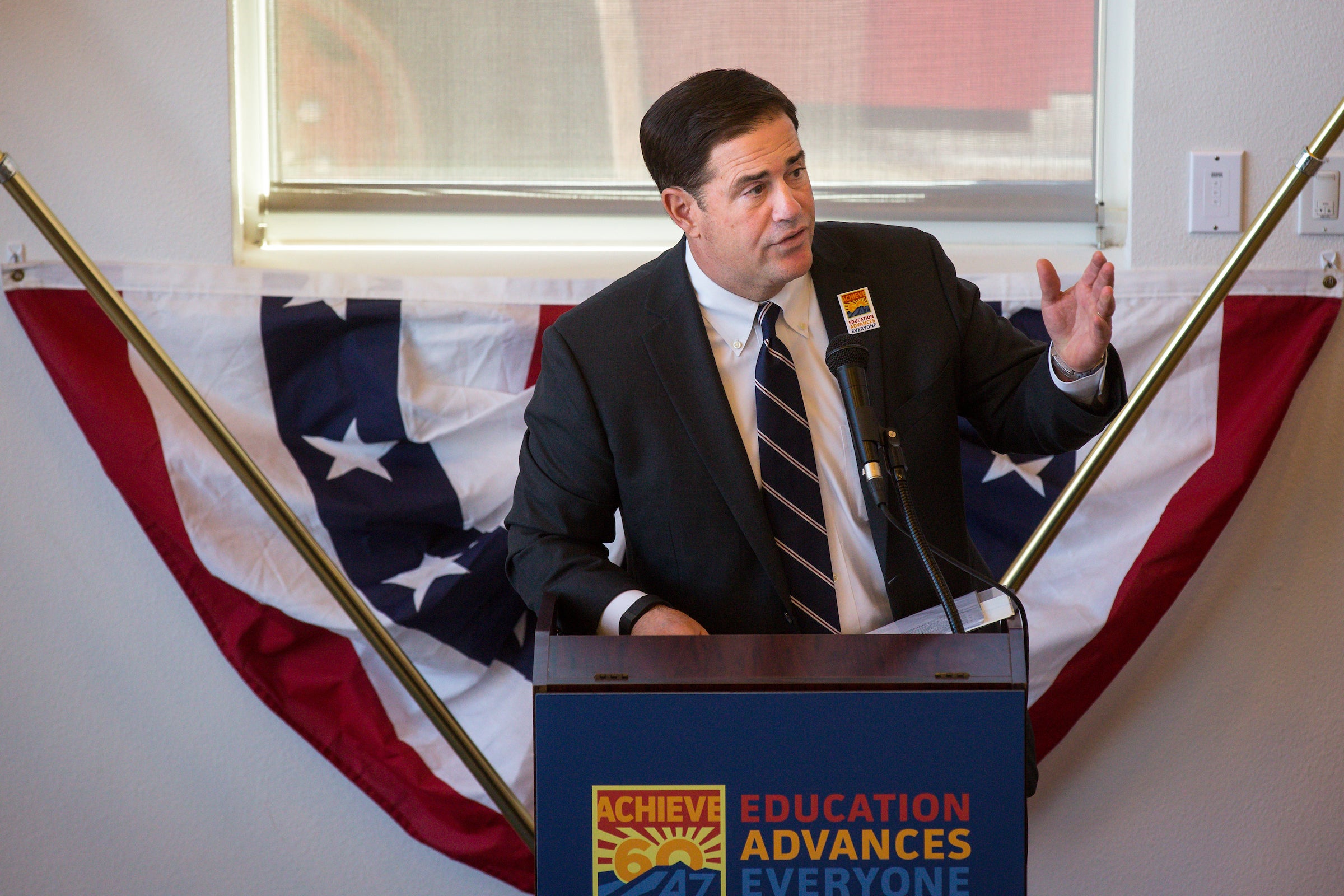Arizona Governor Doug Ducey joined a community-based educational alliance on Friday in announcing a plan to substantially increase the number of college degrees earned in Arizona over the next decade and a half.
The goal is to raise the state’s degree or professional certificate attainment from its current rate of 42 percent to 60 percent by 2030.
A group of 60 community, business, philanthropic and education organizations have joined the initiative to make Arizona’s workforce more innovative and competitive.
“A 21st century economy requires a 21st century workforce,” Ducey told a group of key education, philanthropic and business leaders, at a press conference announcing the venture.
“The message is clear: an additional education past high school is a must. We have to do this. We must do this. And through this goal, we will do this.”
This initiative, called Achieve60AZ, aims to create a more highly-educated population in order to build Arizona’s tax base, decrease poverty, improve social outcomes, replace thousands of baby boomers who are retiring, and attract more business to the state to compete on a national and global stage.
Arizona State University President Michael M. Crow, who called for such an initiative at a breakfast with Arizona legislators in January, said he supports the goal.
“That higher level of education in our society drives scientific discovery, technological invention and understanding in all the fields that guide us forward,” Crow said in a statement released shortly before the governor’s announcement.
In his remarks earlier this year, as he has in many recent speeches, Crow tied the educational attainment to the economic success of the state.
“I can guarantee that reductions in educational attainment, with fewer people going to college, fewer people learning to become master learners, as a percentage of the population, won’t produce good outcomes,” he said in January.
According to the Bureau of Labor Statistics, people with a college degree tend to earn more than non-graduates, have better health, have pension plans, vote, volunteer, spend more time with their children, and are capable of adapting to various careers throughout life.
Arizona Gov. Doug Ducey talks about the goals of the Achieve60AZ initiative to boost educational attainment at the Franklin Police and Fire High School in Phoenix, on Friday, Sept. 16. The initiative is a community-based alliance with the goal of having 60 percent of adults with a professional certificate or college degree by the year 2030. Above, Arizona Board of Regents President Eileen Klein speaks about the initiative. Photos by Charlie Leight/ASU Now
The same data also show the earning power of education. In 2015 dollars, workers can expect to earn $678 on average per week if they have a high school diploma; $738 for those with some college or no degree; $798 for associate degree holders; and $1,137 for individuals with a bachelor’s degree.
ASU, a member of the Achieve60AZ initiative, has as a charter goal the mission to include and educate as many people as possible
“We believe it’s very good to be goal oriented in our actions, and this initiative will help mobilize and organize all of our efforts in achieving those goals,” said Mark Searle, ASU’s executive vice president and university provost.
According to Searle, ASU has increased the number of people earning degrees from more than 14,000 people in 2007 to roughly 20,000 last year.
That is in part due to increasing efforts to reach out to Arizonans and college-going students around the country to offer them the opportunity to attend ASU.
The university is also helping more students earn degrees by providing online programming that awards undergraduate and graduate degrees. The ASU Pathways Program prevents Maricopa County Community College District students from wasting time and money on credits that don’t transfer. In addition, ASU is also cooperating the community college students on reverse transfer, which helps transition students to the university and retroactively awards them an associate’s degree.
Once enrolled, ASU works closely with students to keep them on track, through programs such as eAdvisor, an online tool which prescribes a pathway to graduate in all of ASU’s 370 undergraduate majors, and courses like ASU 101, in which students learn time-management and academic integrity. In ASU 101, students are also introduced to the values of the university, including its focus on sustainability and entrepreneurship. The course teaches all entering freshman best practices to be academically successful in college.
Achieve60AZ has outlined four key focus areas to help achieve their goal, which include: increasing college readiness and high-school graduation rates; putting policies in place to make it easier for adults to finish their certificates or college degrees; raising awareness about options beyond high school and making them affordable; and engaging businesses, governments and educators to identify and close the workforce gap. Specific strategies and tactics will also be developed to track and measure progress.
“The effort behind this effort is truly inspiring,” said Eileen Klein, president of the Arizona Board of Regents. “There are many organizations in our state working to increase job certifications earned and college-going rates.”
Klein said the alliance allows for an ability to share information to help the most students achieve.
“We don’t want students getting lost along the way.”
More Arts, humanities and education

ASU workshop trains educators, professionals from marginalized communities in disaster science
As devastating as hurricanes can be to anyone caught in their paths, they strike marginalized communities even harder.To address this issue, a fund named for a former Arizona State University…

ASU’s Humanities Institute announces 2024 book award winner
Arizona State University’s Humanities Institute (HI) has announced “The Long Land War: The Global Struggle for Occupancy Rights” (Yale University Press, 2022) by Jo Guldi as the 2024…

Retired admiral who spent decades in public service pursuing a degree in social work at ASU
Editor’s note: This story is part of coverage of ASU’s annual Salute to Service.Cari Thomas wore the uniform of the U.S. Coast Guard for 36 years, protecting and saving lives, serving on ships and…

